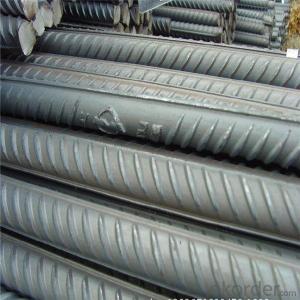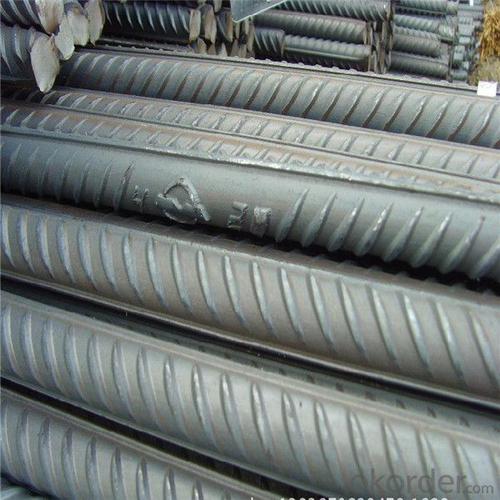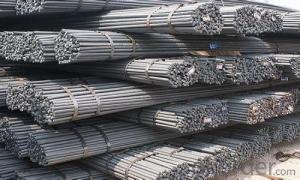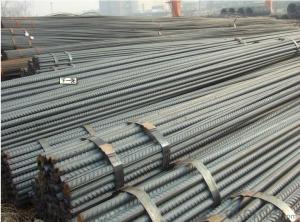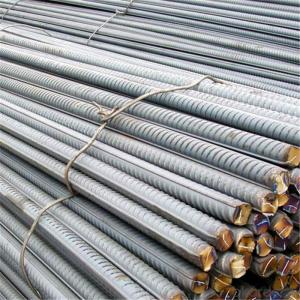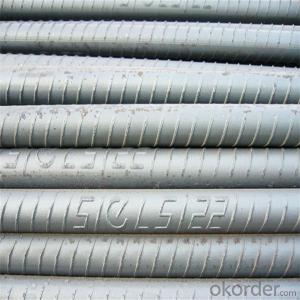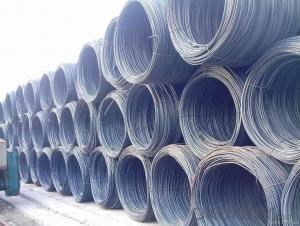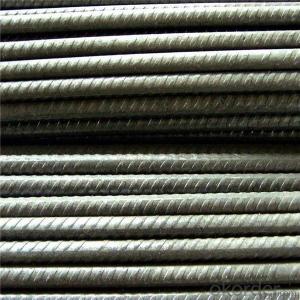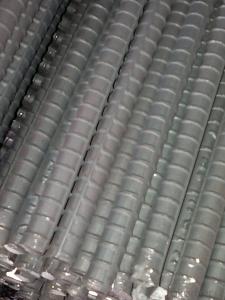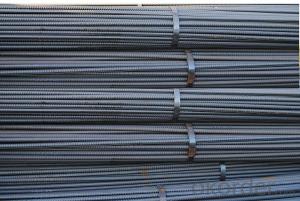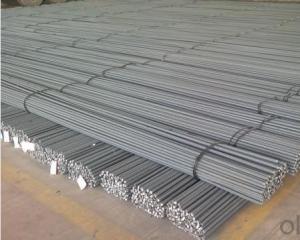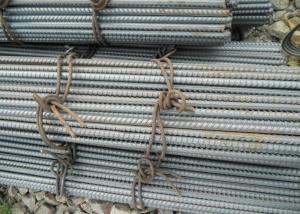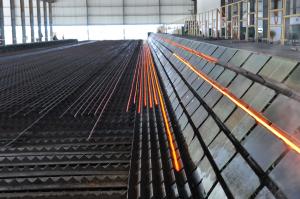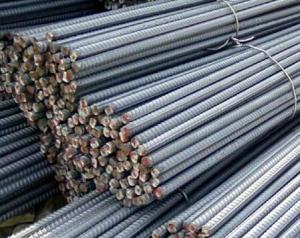Iron rods for construction concrete for building metal
- Loading Port:
- Tianjin
- Payment Terms:
- TT OR LC
- Min Order Qty:
- 1000 m.t.
- Supply Capability:
- 17497 m.t./month
OKorder Service Pledge
OKorder Financial Service
You Might Also Like
Specification
bars of steel commonly used in construction, especially for reinforcing concrete structures such as driveways,
foundations, walls, and columns. These bars come in different sizes and strength grades, and can be smooth
or may include deformations that provide greater adhesion for concrete poured over the bars. When used in poured
concrete, the bars are typically placed in a grid pattern, the concrete poured over them, and then readjusted to
maintain the proper shape while the concrete sets. Steel rebar can be purchased from a number of manufacturers
and is often found at construction retailers or large hardware stores
Product Description :
Chemical composition (%): | Steel | C | Si | Mn | P | S | Ceq | ||||
HRB335 |
0.25 |
0.80 |
1.60 |
0.045 |
0.045 | 0.52 | |||||
HRB400 | 0.54 | ||||||||||
HRB500 | 0.55 | ||||||||||
Mechanical properties | Steel | Rel/ MPa | Rm/ MPa | A/ % | Agt/ % | ||||||
≥ | |||||||||||
HRB335 | 335 | 455 | 17 |
7.5 | |||||||
HRB400 | 400 | 540 | 16 | ||||||||
HRB500 | 500 | 630 | 15 | ||||||||
Package: | Standard export packing or as customer's request | ||||||||||
Application: | Construction, building, bridge, road. ect | ||||||||||
Payment terms | 1).100% irrevocable L/C at sight. | ||||||||||
Delivery time | 15-30 days after receipt of L/C or deposit by T/T | ||||||||||
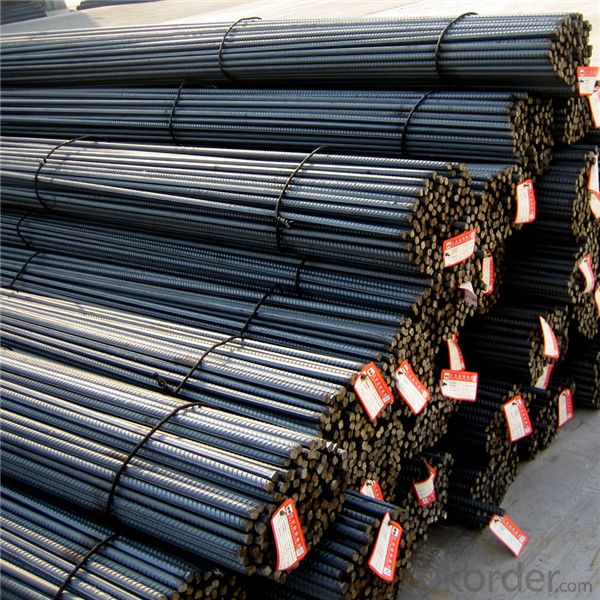
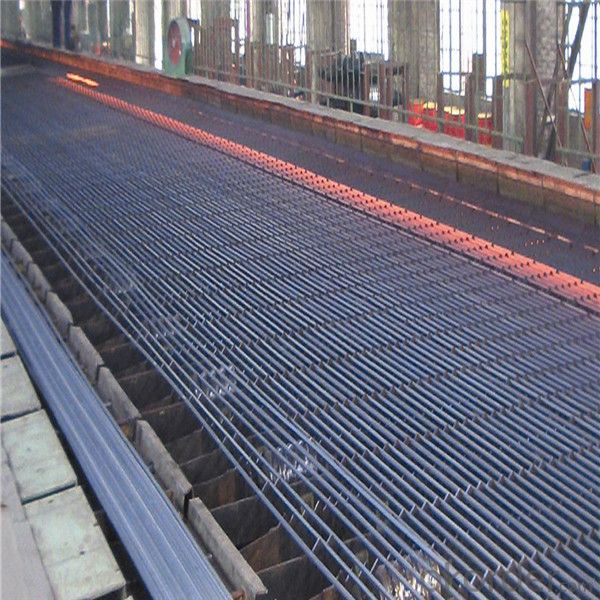
Features
1、Pure steel quality, stable chemical contents, small tolerance.
2、Constant Quality, good drawing performance.
3、High dimension accuracy degree, accuracy degree of Level C up to 80%, smooth surface, less scale, easy to be pickled.
4、Automatic bundling with 4 lines by Machine in tidy and good looks
5、Big high quality percentage, small coil percentage, and heavy coil weight for Hard Coil.
6、High sorbitizing percentage.
Packing:
In bundles, each bundle weight 3.5 tons. Load by container or by bulk verssel.
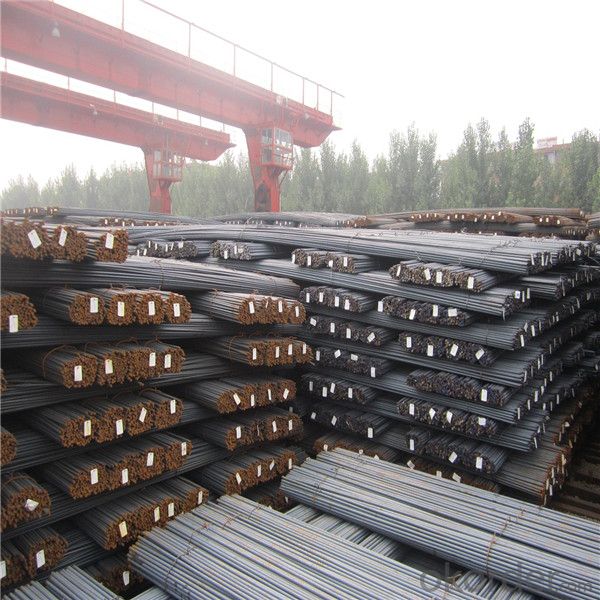

FAQ:
1.Q: What's your MOQ(minimum order quantity)?
A: One full container, mixed acceptable .
2. Q: What's your packing methods?
A: Packed in bundle or bulk ..
3. Q: How can I buy CNBM products in my country?
A:Please send us an inquiry or email ,we will reply to you if there is distributor in your country
4. Q: Can we visit your factory?
A: Warmly welcome. Once we have your schedule, we will arrange the professional sales team to follow up your case.
5. Q: How long does it take to get the product if i place an order?
A:With the process of your requirements,we will pack and deliver in 3-7 days. If it is by sea shipment,it will take 15-45 days depending on different locations
- Q: Can steel rebars be used in pre-tensioned concrete structures?
- No, steel rebars cannot be used in pre-tensioned concrete structures. Pre-tensioned concrete structures require the use of high-strength, prestressed steel strands that are tensioned before the concrete is cast, providing the necessary strength and structural integrity.
- Q: What is the effect of steel rebars on the seismic performance of a structure?
- Steel rebars have a significant positive effect on the seismic performance of a structure. By reinforcing the concrete, rebars enhance the strength and ductility of the building, allowing it to better withstand seismic forces. This reinforcement helps prevent structural failure, reduces the risk of collapse, and improves overall stability during an earthquake.
- Q: What are the different types of steel rebars used in airport construction?
- There are generally two types of steel rebars commonly used in airport construction: epoxy-coated rebars and stainless steel rebars. Epoxy-coated rebars are corrosion-resistant and provide protection against chemicals often found in airports, such as de-icing agents. Stainless steel rebars, on the other hand, offer superior resistance to corrosion and are often used in areas with high humidity or exposure to saltwater. Both types of rebars are essential in ensuring the structural integrity and longevity of airport infrastructure.
- Q: What grade of reinforcement is used for cast-in-place floorslab?
- Compared with the floor slab, the cast-in-place concrete can strengthen the integrity and the seismic resistance of the building, and has greater bearing capacity. At the same time, in insulation, sound insulation, waterproof and other aspects also have certain advantages.
- Q: What are the common grades of steel rebars?
- The common grades of steel rebars include Grade 40, Grade 60, and Grade 75.
- Q: What are the different types of steel rebars used in railway bridges?
- There are several types of steel rebars used in railway bridges, including plain carbon steel rebars, epoxy-coated rebars, and stainless steel rebars. Each type of rebar offers unique properties and benefits to ensure the durability and strength of railway bridges.
- Q: What are the guidelines for using steel rebars in pre-stressed or post-tensioned concrete elements?
- Several key considerations must be taken into account when using steel rebars in pre-stressed or post-tensioned concrete elements to ensure structural integrity and performance. 1. Design and Engineering: The initial step is to consult with a qualified structural engineer who specializes in pre-stressed or post-tensioned concrete design. They will determine the specific project's requirements for rebars, including size, spacing, and type, based on the structural loads, design requirements, and desired performance. 2. Material Selection: The rebars used in pre-stressed or post-tensioned concrete elements should adhere to industry standards, such as ASTM A615 or ASTM A706 for reinforcing steel. The rebars should possess adequate strength, ductility, and corrosion resistance to withstand environmental conditions and stress. 3. Placement and Anchorage: Precise placement and anchoring of the rebars within the concrete elements are necessary. The requirements for placement and anchorage will depend on the project's design and engineering specifications. Proper alignment and secure fastening of the rebars are crucial to ensure effective force transfer to the concrete. 4. Tensioning Process: In pre-stressed concrete elements, the rebars are tensioned before pouring the concrete. Specialized jacks or hydraulic systems are used to apply a predetermined amount of force to the rebars. Careful control of the tensioning force is vital to achieving the desired level of pre-stress without overloading the rebars or damaging the concrete. 5. Post-Tensioning: For post-tensioned concrete elements, the rebars are tensioned after the concrete has hardened. This involves passing the rebars through ducts or sleeves within the concrete and applying tension using hydraulic jacks. The post-tensioning force must be carefully calibrated to achieve the desired structural performance without excessive strain on the rebars or the concrete. 6. Quality Control and Inspection: Throughout the construction process, regular quality control and inspection are essential to ensure compliance with design specifications and industry standards. This includes verifying correct placement, alignment, and tensioning of the rebars, as well as checking for any defects or damage. 7. Maintenance and Durability: Proper maintenance is crucial for the long-term durability and performance of pre-stressed or post-tensioned concrete elements. This may involve periodic inspections, maintaining protective coatings, and addressing corrosion or deterioration promptly. By adhering to these guidelines, construction professionals can ensure the safe and effective use of steel rebars in pre-stressed or post-tensioned concrete elements, resulting in structurally sound and durable concrete structures.
- Q: Can steel rebars be used in wastewater treatment plant construction?
- Yes, steel rebars can be used in wastewater treatment plant construction. Steel rebars are commonly used for reinforcement in concrete structures, providing strength and durability to withstand the harsh conditions present in wastewater treatment plants.
- Q: What are the common quality tests performed on steel rebars?
- The common quality tests performed on steel rebars include visual inspection, dimensional measurement, tensile strength testing, bending test, weldability test, and corrosion resistance test.
- Q: What is the minimum yield strength of steel rebars?
- The minimum yield strength of steel rebars is typically around 40,000 pounds per square inch (psi).
Send your message to us
Iron rods for construction concrete for building metal
- Loading Port:
- Tianjin
- Payment Terms:
- TT OR LC
- Min Order Qty:
- 1000 m.t.
- Supply Capability:
- 17497 m.t./month
OKorder Service Pledge
OKorder Financial Service
Similar products
Hot products
Hot Searches
Related keywords
